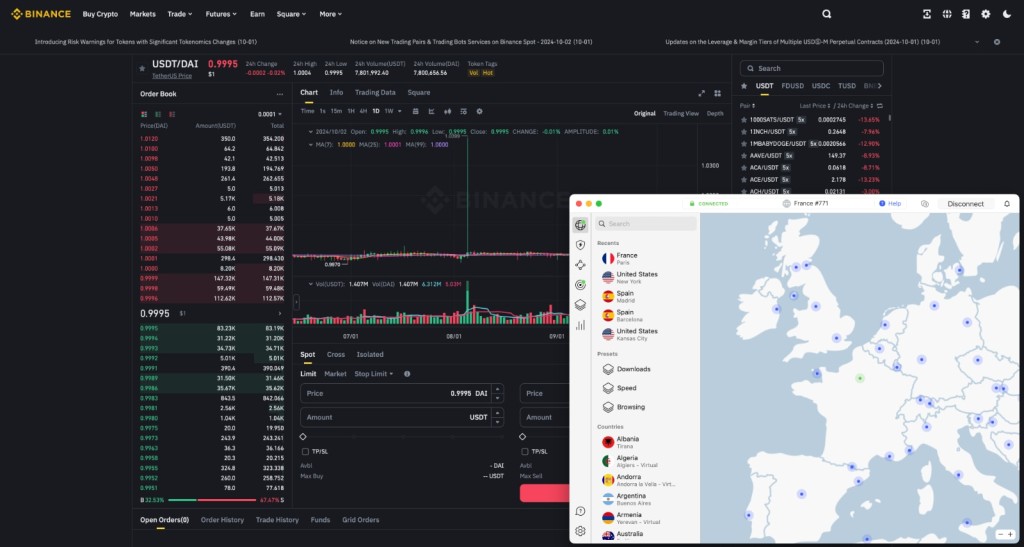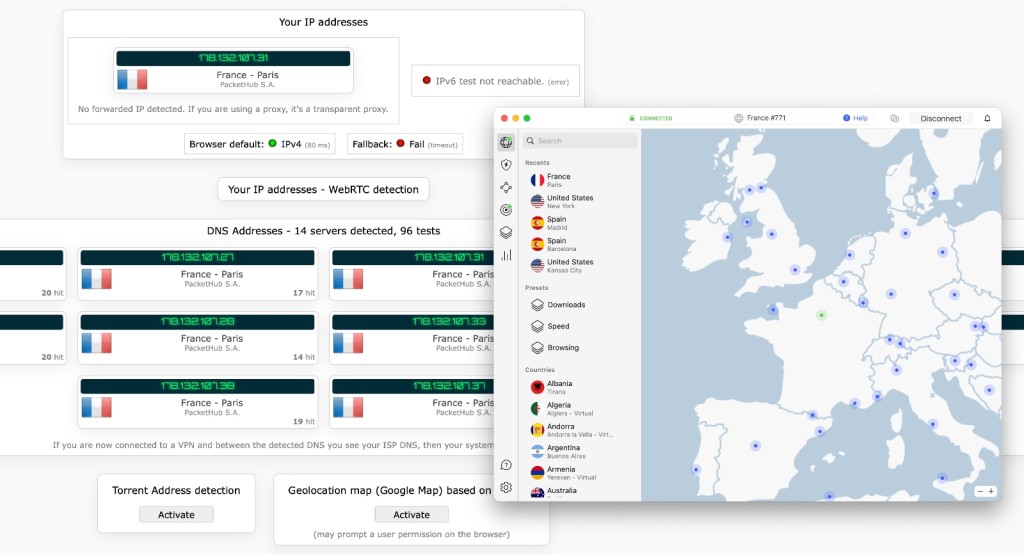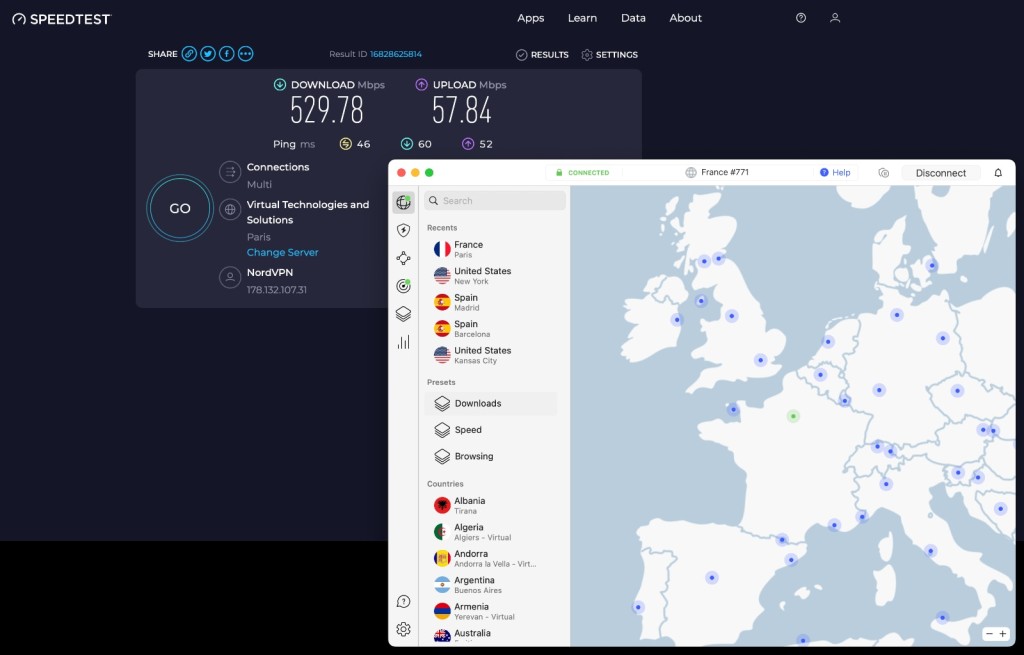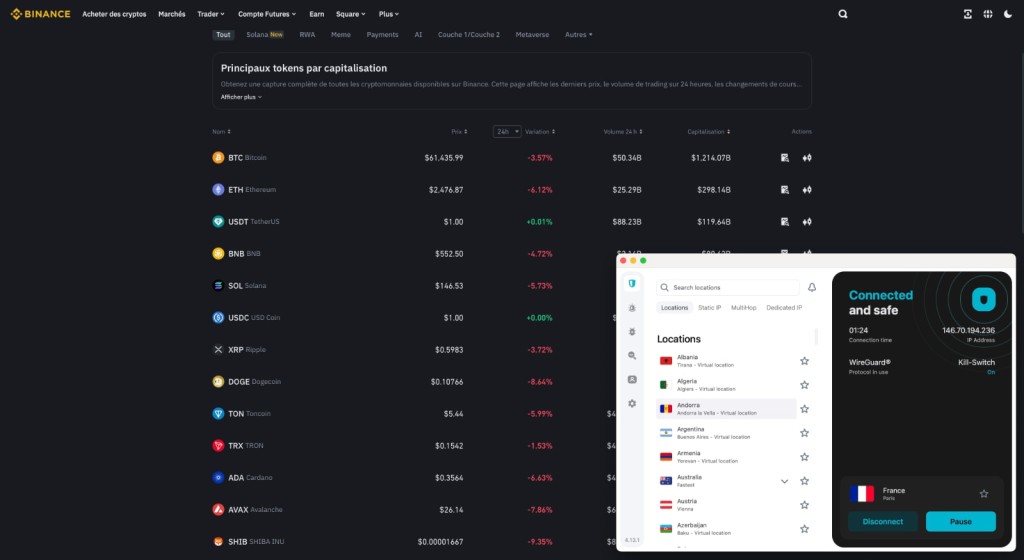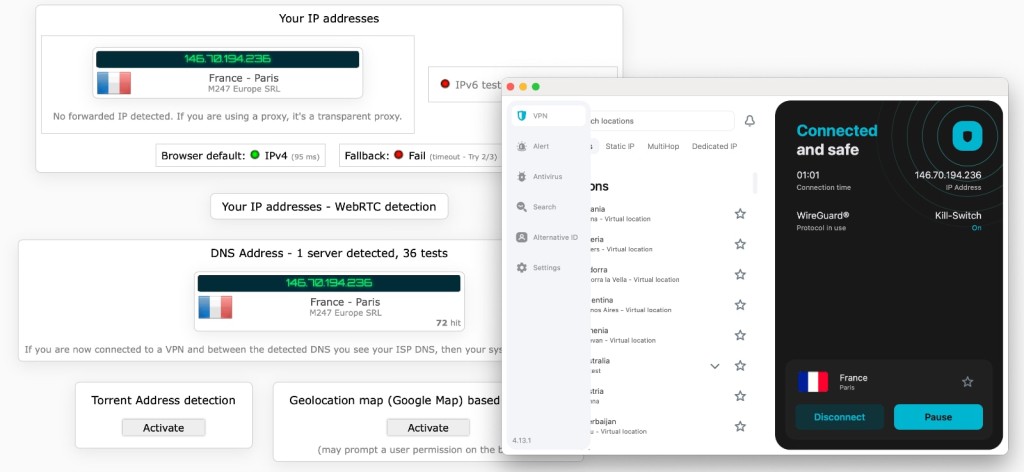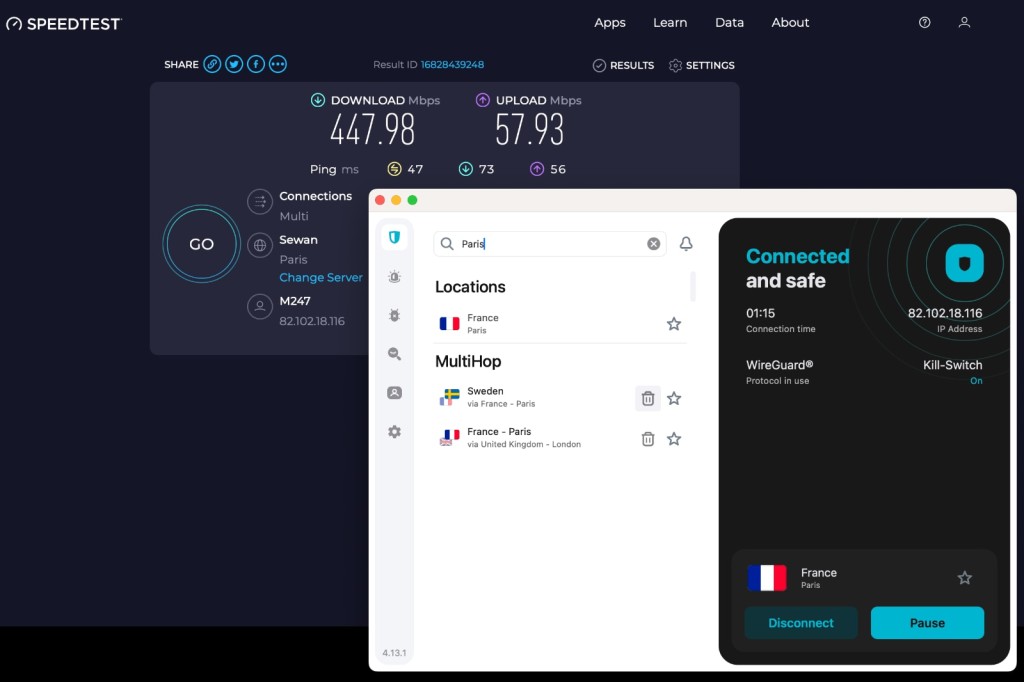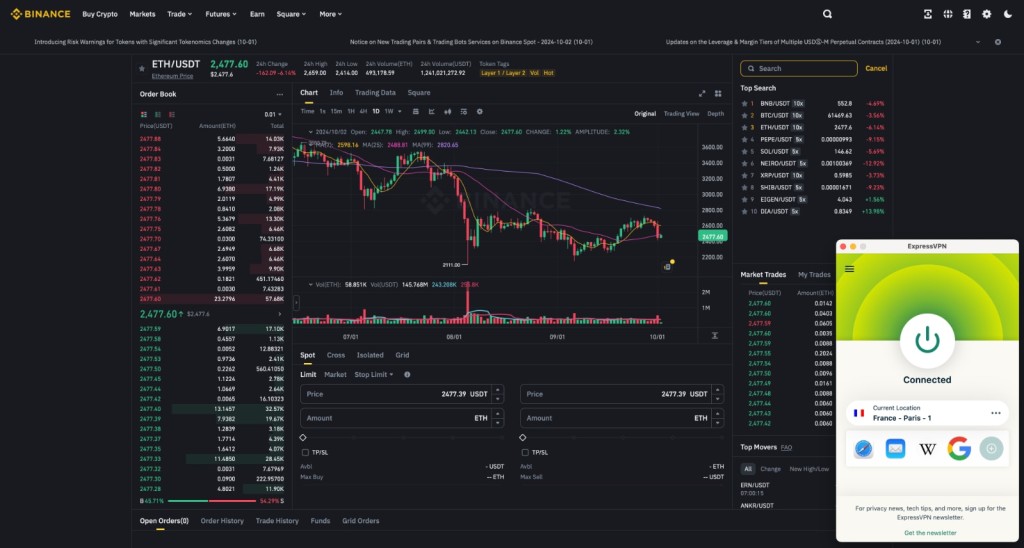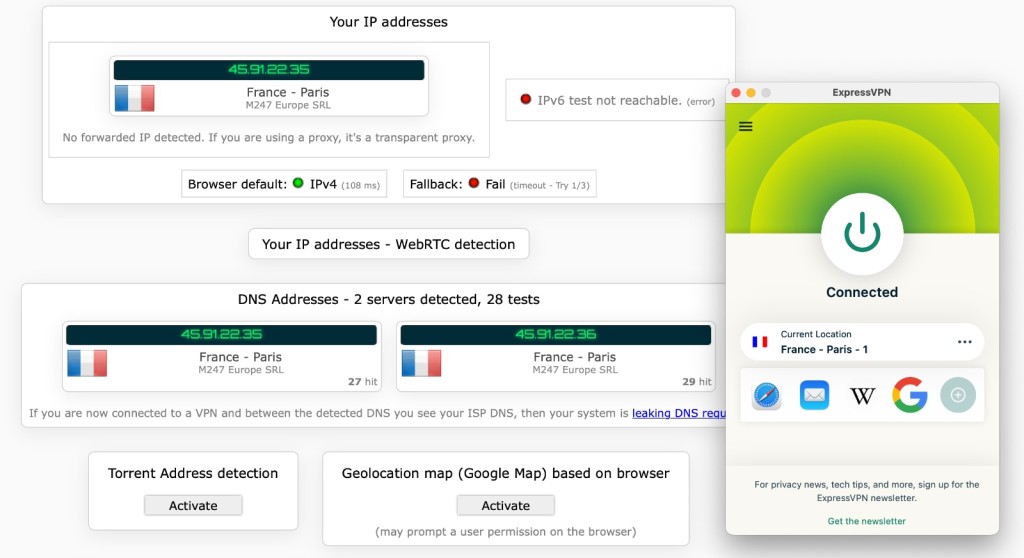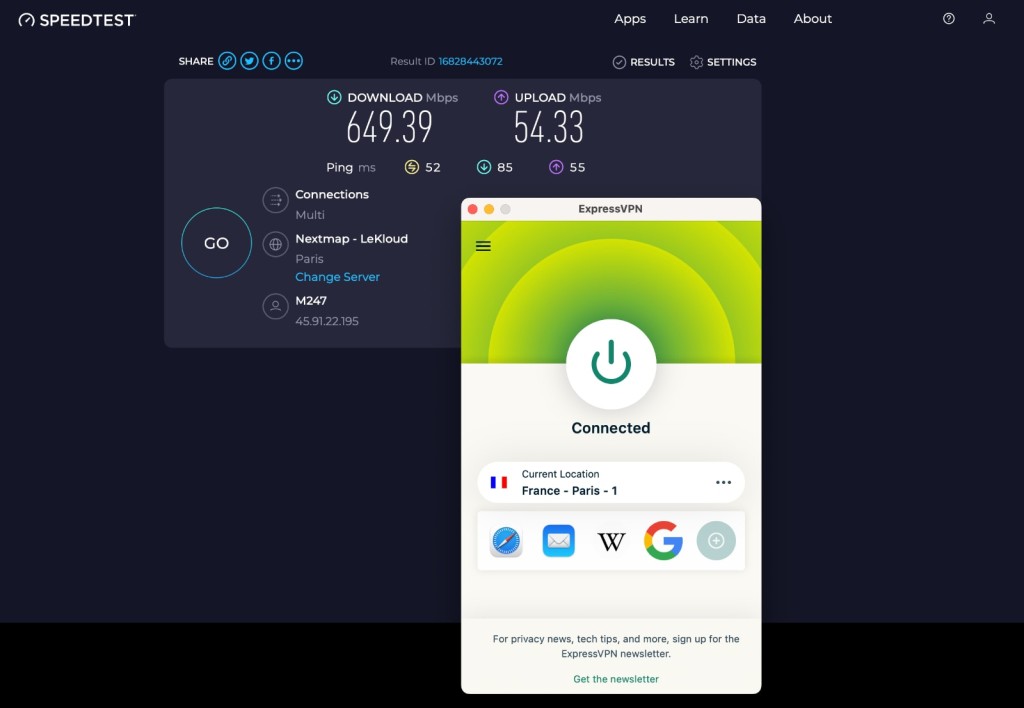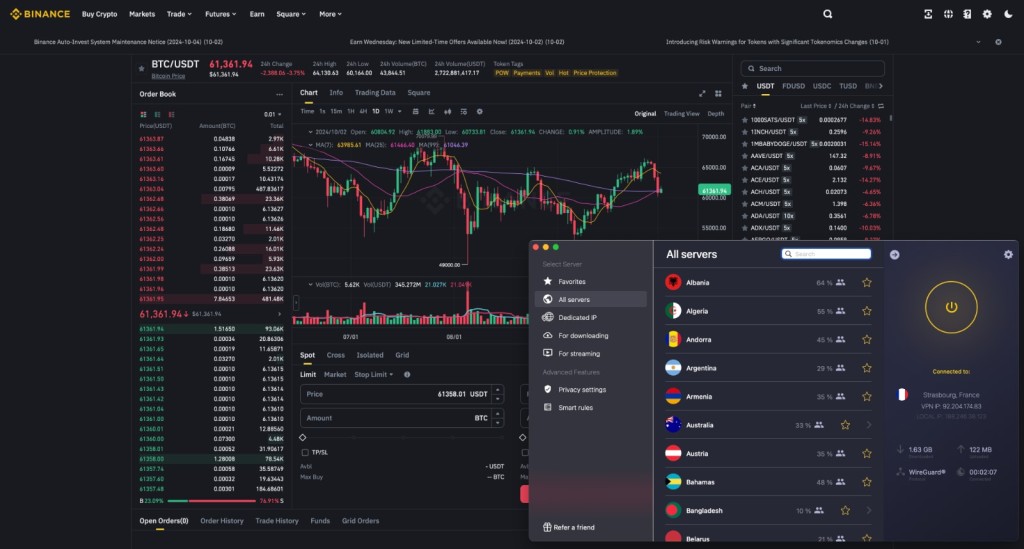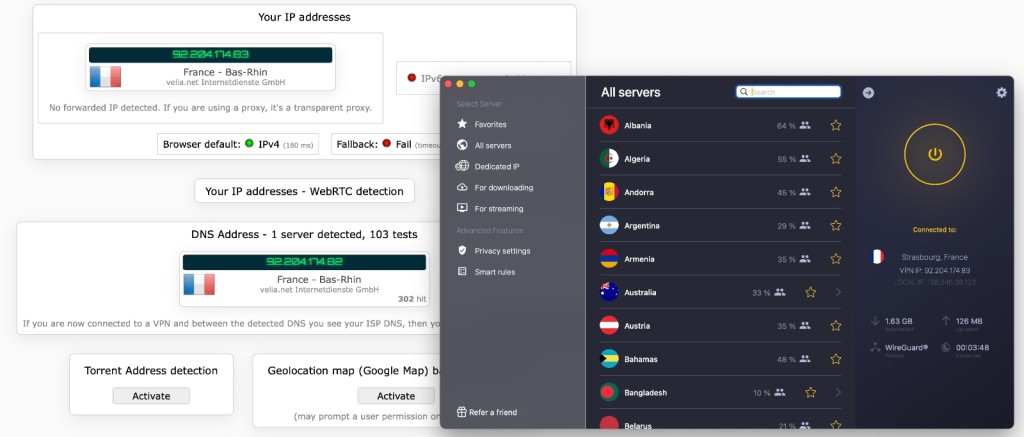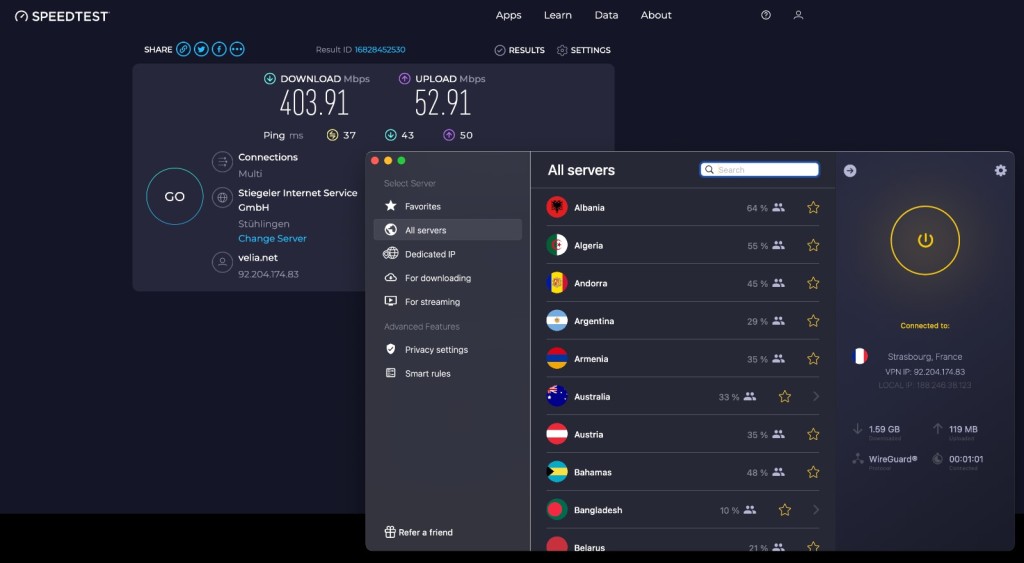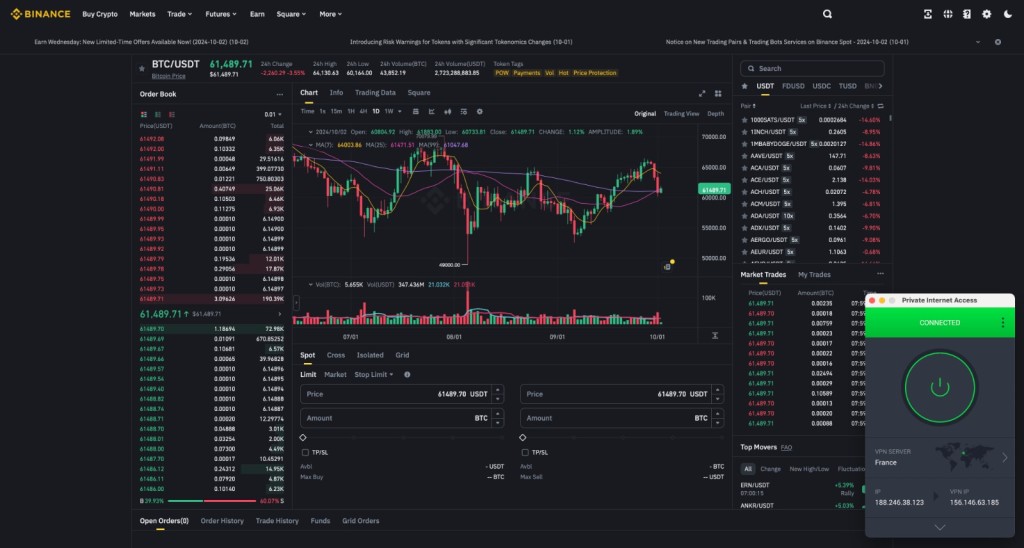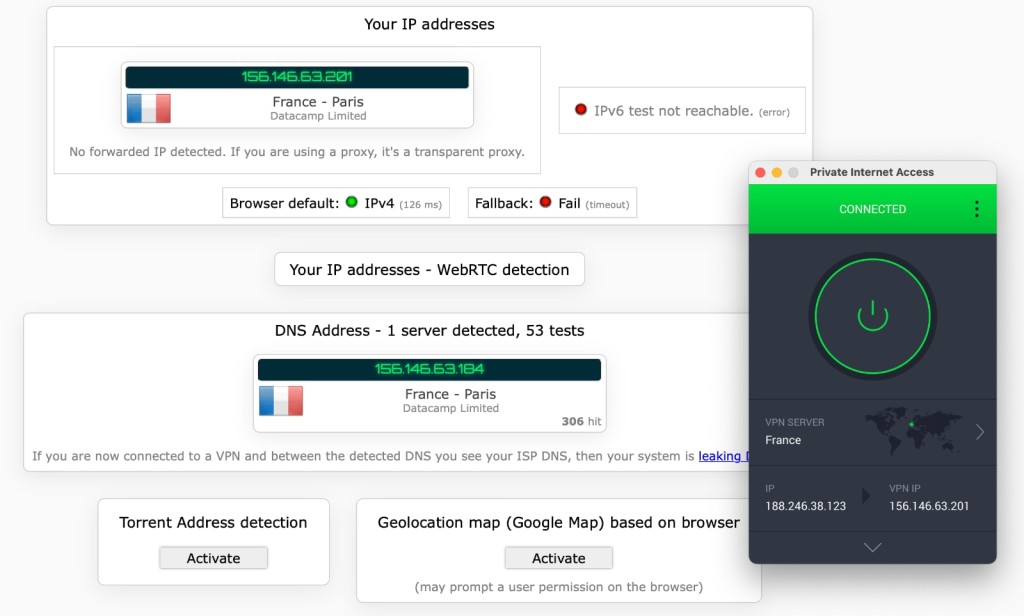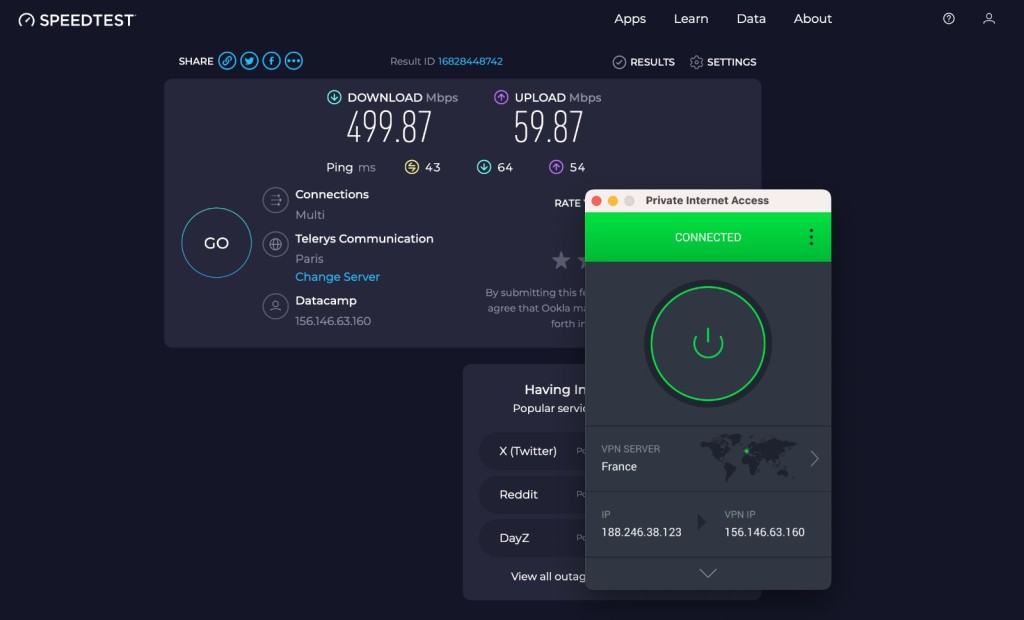When you purchase through links on our site, we may earn an affiliate commission. Here’s how it works.
5 Best VPNs for Crypto Trading in 2024
Our experts have reviewed 53 VPN providers, which were put through extensive rounds of testing. To learn more about that process, here’s how we review VPNs, where we explain our criteria and our policy of being fully transparent.
Cryptocurrencies, as well as traditional digital transactions, are prone to malicious manipulation. In other words, hackers often target crypto wallets, exchanges, and platforms. However, you can protect your cryptocurrencies using a VPN, which can encrypt and safeguard your data.
We've seen many instances where crypto users faced security threats resulting in the loss of private keys and access to their assets. In practically all those cases, crypto users failed to secure their data properly. That said, a VPN will ensure your online activity is secure and hidden from third parties.
However, VPNs do much more than just keep your digital privacy protected. They can help you access crypto trading platforms blocked in your country. And if you get a VPN that accepts cryptocurrencies, you’ll also reach a whole new level of anonymity.
In this guide, we’ll talk about the best VPNs for crypto trading, share how to use one, and talk about the best crypto trading platforms. We'll also share why you need a VPN, how to find the best VPN based on your needs, and which VPNs accept crypto. We'll finish with a round of FAQs.
How to Use a VPN to Buy Crypto
The first step towards anonymizing your traffic is to sign up for a VPN. You'll then install its app and connect to a server, which is when you can interact with crypto platforms. Do the following:
- Sign up for a VPN suitable for crypto trading (we recommend NordVPN).
- Download and install the VPN app on your device.
- Launch the VPN application and access your account by logging in.
- Initialize your VPN session by connecting to a secure server.
- You can now interact with crypto trading platforms and manage your funds.
Some crypto trading platforms require KYC verification when investing or withdrawing larger amounts. Even when using a VPN to trade crypto, if you're asked to verify your identity, you'll be required to upload your personal ID card, and that's not something a VPN can help you hide. So, before using crypto trading platforms, make sure to know their Terms/Conditions of Use.
Also, the best VPN location for crypto trading is based on the home country of the crypto platform you plan to use. However, keep in mind what we said above - as you might be asked to go through a KYC verification procedure.
The Best VPNs for Crypto Trading in 2024
Your approach to choosing the best option must be based on certain criteria. That said, make sure your chosen VPN unblocks crypto platforms, especially if you're in a country where crypto isn't yet regulated. For that to happen, pick a VPN with a sizable server network covering as many locations and countries as possible.
Then, make sure your privacy and security are covered. Go with a VPN with a no-logs policy (an audited one, preferably), robust protocols (OpenVPN, WireGuard), and strong encryption (AES-256). Also, you'll want VPNs with obfuscated servers, which will hide the fact that you're using one in the first place.
A kill switch should be there to make sure your data doesn't leak. And if you often access crypto platforms, split-tunneling will help you create a VPN and non-VPN tunnel so that your regular Web connection remains fast. Speaking of that, a VPN should be fast without introducing a noticeable slowdown.
Let's not forget that your chosen VPN must support enough simultaneous connections and bring apps for any devices/platforms you might use. You should also be after a VPN with a good price and plenty of value. It should also have a liberal money-back policy along with 24/7 live chat customer support.
In preparation for this article, our team tested more than 50 VPN providers. Based on our findings, these are the 5 best VPNs for crypto trading we recommend:
1. NordVPN - Our #1-Rated Best VPN for Crypto Trading in 2024
NordVPN is an ultra-capable VPN provider, offering 6,400+ servers in 111 countries, which allows you to change your location in an instant. That means you'll get to access crypto platforms and exchanges from 111 different countries, including Binance, Kraken, ByBit, Coinbase, KuCoin, and more.
Of course, your privacy is covered more than well. This is a highly reputable no-logs VPN, based in Panama, with many independent audits under its belt. It's powered by OpenVPN, IKEv2/IPsec, and NordLynx, its own spin on the WireGuard protocol. Your VPN tunnel will be secured by AES-256 or ChaCha20, making it virtually impossible for anyone to track you.
If you need extra security, NordVPN offers obfuscated servers. Not all servers are obfuscated, so you'll need to stick to a group of pre-defined ones. Also, there's a kill switch that allows you to pick the apps that shut down if something unexpected happens. Split tunneling is there as well, and you also get total protection against DNS, IP, and WerbRTC leaks - as tested by our team.
We'll also praise NordVPN's performance. This VPN has been working hard lately to upgrade its network, so now its nearby and remote servers are equally fast. We managed to get 529 Mbps on a 700 Mbps connection. That said, you really don't need an ultra-fast Web connection to take full advantage of NordVPN. Plus, this VPN will perform great even during high-traffic times.
Also, this VPN supports up to 10 simultaneous connections. It also has modern-looking apps for computers, phones, and routers. Therefore, pairing it with your crypto platforms is going to be a one-minute process at most.
If you pick NordVPN's 2-year subscription plan, you can get everything mentioned above at $3.09/month. You'll also get a 30-day money-back guarantee and 24/7 live chat support. And if you wish to pay using a cryptocurrency, NordVPN supports that option via CoinGate.
To learn what else to expect, visit our hands-on NordVPN review.
PROS
- Unblocks crypto platforms.
- Servers in 111 countries.
- Supports cryptocurrencies.
- Amazing performance.
- Free of DNS/IP/WebRTC leaks.
- Audited no-logs policy.
- 24/7 support by live chat.
- 30-day money-back policy.
CONS
- Pricey month-to-month plans.
2. Surfshark - Speedy Crypto VPN for High-End Privacy Protection
Surfshark is a feature-packed VPN provider with 3,200+ servers in 100 countries, giving you tons of options when deciding how you want to route your traffic. Also, it means you'll get to unlock a huge number of crypto platforms with ease, such as Binance, OKX, Coinbase, and dozens more.
This is also one of the safest VPNs, headquartered in the Netherlands, based on OpenVPN, IKEv2/IPsec, and WireGuard. Its audited no-logs policy goes hand in hand with encryption protocols like AES-256 and ChaCha20. So, you can be sure that this VPN won't know what you do online - and neither will your Internet provider or anyone else on the Web.
Obfuscation is also present in the form of 'NoBorders' mode. This feature isn't on by default, so make sure to visit Surfshark's settings as soon as you install it. And to make sure your data doesn't leak, this VPN has a kill switch. Split tunneling is on offer as well. Based on our tests, don't expect any IP, DNS, or WebRTC leaks, no matter which server or protocol you select.
We'll also praise Surfshark's performance, especially when using WireGuard. It's among the fastest VPNs right now, introducing barely noticeable slowdowns. This provider managed to get us 447 Mbps on a 700 Mbps connection, and its performance was stellar even during high-traffic periods. To top it all off, this VPN supports unmetered (unlimited) simultaneous connections.
As you can expect, Surfshark also covers practically any device or platform imaginable. It has incredibly polished software for computers (Windows, Mac, Linux), and phones (iOS, Android), and all kinds of routers are covered as well.
This VPN comes at an affordable price - only $2.19/month for its 2-year subscription. You'll also love the fact that a 30-day money-back policy is there, with no questions asked. Of course, you can also count on 24/7 live chat support.
Interested in learning more? If so, don't forget to check our Surfshark review.
PROS
- Unblocks any crypto platform.
- Servers in 100 countries.
- Unlimited simultaneous connections.
- No data leaks detected.
- Reliable and stable performance.
- Strict no-logs policy.
- 30-day money-back policy.
- 24/7 live chat support.
CONS
- Can take a while to connect.
3. ExpressVPN - Powerful VPN for Crypto with Obfuscated Servers
ExpressVPN is another powerful option, as it gives you access to any crypto platform in the world, which includes Binance, Kraken, KuCoin, Bitget, Gate.io, and more. This VPN's website-unblocking capabilities are legendary and unparalleled in the cyber-sec world. On top of that, it has thousands of servers in 105 countries, featuring a network evenly distributed throughout the world.
You'll find a strict no-logs policy here, audited many times in the past. There are also high-end protocols, like OpenVPN, IKEv2/IPsec, and Lightway (ExpressVPN's own protocol). And in terms of encryption, AES-256 and WolfSSL are there to make sure no one sees your crypto trading activities.
We'll also mention that all ExpressVPN servers are obfuscated. There's also a kill switch (called Network Lock) that prevents your data from surfacing on the Web if your VPN session ends abruptly. You'll also get split-tunneling and protection against IP, DNS, and WebRTC leaks. We tested several near and remote servers and encountered zero data leaks.
What's impressive here is that you get all those VPN features without significant slowdowns. When testing its France-based server, which unblocks Binance fully, we got 649 Mbps on a 700 Mbps baseline connection. Truly impressive overall, especially since ExpressVPN's performance doesn't fluctuate even during critical trading times.
No matter which subscription plan you pick, ExpressVPN will give you 8 simultaneous connections, which seems quite generous. Of course, you'll also get native software for computers (Windows, Mac, Linux), mobile devices (iOS, Android), and even routers.
To start using this British Virgin Islands-based VPN, you'll need to pay $6.67/month for its annual plan. ExpressVPN also provides you with a 30-day money-back guarantee (with no questions asked) and 24/7 live chat customer support. And since we're talking about crypto, know that you can buy ExpressVPN using Bitcoin (via BitPay).
Our ExpressVPN review explains in-depth why we recommend this provider.
PROS
- Unblocks any crypto platform.
- Sizable selection of servers.
- 100% obfuscated fleet.
- Leak-free data tunnels.
- Amazing performance.
- Supports cryptocurrency.
- 30-day money-back policy.
- 24/7 live chat support.
CONS
- On the pricier side.
4. CyberGhost VPN - User-Friendly VPN to Buy Crypto Anonymously
CyberGhost is a well-known and reputable VPN brand known for its all-in-one character. More importantly, this VPN is known for unblocking all kinds of websites, including crypto platforms. During our testing, it managed to unblock. Binance, ByBit, OKX, KuCoin, Kranen, and more. Also, you'll be surprised to know that CyberGhost has thousands of servers in 100 countries.
As you'd expect, this is a no-logs VPN provider with a recently audited privacy policy. Aside from that, there's OpenVPN, IKEv2/IPsec, and WireGuard, paired with AES-256 and ChaCha20. No matter which protocol you pick, you'll always have access to all the servers this VPN offers, which is not always the case with its competitors.
We also need to add that CyberGhost VPN doesn't use obfuscation. Normally, that's not a big downside, as long as you're not in a country with heavy censorship, like the UAE and China. Speaking of more advanced features, this VPN has a kill switch that works in the background while also offering split tunneling on Windows and Android. There's also full support for data leak protection - CyberGhost produced zero issues when tested against DNS, IP, and WebRTC leaks.
When it comes to its performance, CyberGhost won't disappoint you even during high-traffic times. It's not the fastest option available, but it works more than well overall. Highly remote servers can introduce some slowdowns, so it would be good to have fast baseline speeds in that case. For example, its France-based server got us 403 Mbps on a 700 Mbps connection.
There are simple-to-use applications for computers (Windows, Mac, Linux), mobile devices (iOS, Android), and there's support for routers as well. You also get 7 simultaneous connections, which is more than you'll need to cover all your devices at once.
This Romania-based VPN starts at only $2.19/month for its 2-year plan, and there's a 45-day money-back policy. There's also 24/7 live chat support as well as support for cryptocurrencies. You'll need to use BitPay to pay for this VPN, making the sign-up procedure quite simple.
To see this provider in action, make sure to visit our CyberGhost review.
PROS
- Unblocks crypto platforms.
- Servers in 100 countries.
- Supports BitPay for payments.
- Free of data leaks.
- Stable performance.
- Strict no-logs policy.
- 45-day money-back policy.
- 24/7 live chat support.
CONS
- Obfuscation isn't present.
- Slower than its competitors.
5. Private Internet Access - High-End VPN for Advanced Crypto Traders
PIA is another powerful VPN service that comes with a really high server count (highly secure and blazing-fast) in 90+ countries. Since it uses advanced VPN technologies, you can count on unblocking crypto platforms without any effort on your part. This VPN makes it easy to access ByBit, Binance, OKX, Coinbase, Kranen, and more.
More precisely, this VPN supports OpenVPN, IKEv2/IPsec, and WireGuard, both of which you can further optimize and fine-tune. The same applies to PIA's encryption, which comes in the form of AES-128/256 and ChaCha20. Then, there's a no-logs policy and even open-source apps.
The best thing about this US-based VPN is how customizable it is - allowing you to fine-tune its kill switch, which can be system-level or app-based. The same goes for split tunneling, which has tons of fine-tuning options. There's also obfuscation in the form of Shadowsocks. Plus, let's not forget that PIA produces zero IP/DNS/WebRTC leaks, as proven by our hands-on tests.
We'll also note that out of the box, PIA provides reliable performance with minor fluctuations during high-traffic periods. However, since it comes with in-depth customization, more advanced crypto traders can dive in and come up with a combination of privacy and speed that fits their needs. During our tests, this provider got us 499 Mbps on a 700 Mbps connection.
PIA also supports unlimited simultaneous connections, which is a recently introduced feature. However, what's not new is PIA's presence on computers, phones, tablets, and routers. You'll enjoy using this VPN's apps, which offer a mobile-like interface across all devices.
PIA has always been known for its great price, so it's no surprise that it currently costs $2.19/month for its 2-year subscription. To make your investment risk-free, PIA offers a 30-day money-back policy. Aside from that, you'll count on 24/7 live chat customer support.
Our Private Internet Access review will show you this VPN's behind-the-scenes.
PROS
- Unblocks crypto platforms easily.
- Servers in 90+ countries.
- No-logs and open-source.
- No DNS/IP/WebRTC leaks.
- High-end data privacy.
- In-depth customization.
- 30-day money-back policy.
- 24/7 live chat support.
CONS
- Requires some optimization.
- Best for experienced VPN users.
Comparison of the Best VPNs for Crypto Trading
How Do We Test the Best Crypto VPNs in 2024?
Our team tested more than 50 VPN providers through a series of steps to ensure that we recommend only the best options. In this case, we focused on the specific needs of cryptocurrency transactions, ensuring that you have the needed security, speed, and compatibility. Let's take a closer look at each step of your hands-on testing procedure.
1. Inspecting Security & Privacy Features
Digital security is imperative when transacting crypto, so we test each VPN's encryption first. Before testing the VPNs hands-on, we review their technical documentation to learn about each provider's specifications for encryption. Then, we use Wireshark, a popular and open-source network protocol analyzer, to check how well each VPN encrypts our incoming and outgoing data.
We also test for data leaks using IPLeak.net (for IP leaks), DNSLeakTest.com (for DNS leaks), and BrowserLeaks.com (for WebRTC leaks).
2. Running Speed Tests Across Multiple Servers
Our goal is to find a VPN that offers equally fast nearby and remote connections. So, we connect to servers in countries like the US, Canada, the UK, France, and Australia, as those are some of the most popular digital crypto "destinations." After testing the download/upload speed of our baseline Web connection, we use SpeedTest.net to check the performance of each VPN server.
3. Checking Overall Connectivity and Reliability
You'll want a VPN that doesn't interfere with your Web connectivity at any moment. That's why we test each VPN for an extended period of time, keeping them active in the background. Our team notes any disconnections, interruptions, or connection drops. Plus, we run tests on multiple platforms (PC, phone, and tablet) to ensure you get the same level of performance across the board.
4. Assessing Crypto-Friendly VPN Features
In this step, we focus on two crucial VPN features. We first check how each VPN's kill switch works, which is what helps prevent data leaks. This test is done by simulating a connection drop and noting whether the kill switch kicks into action. We also check how well split-tunneling works by ensuring that our crypto-trading activities are protected while maintaining a non-VPN data tunnel.
5. Testing Compatibility with Trading Platforms
To ensure that our recommended VPNs work across various crypto trading platforms, we test them against platforms like Binance, Coinbase, and Kraken. These are long-term tests where our team notes if any errors appear. We pick those VPNs that guarantee a seamless experience, meaning you can leave them enabled 24/7 without interfering with your crypto trading.
6. Bypassing Geo-Restrictions on Crypto Platforms
Most crypto platforms are geo-restricted, as they need to comply with each country's crypto regulation. These geo-blocks can be quite advanced in many cases, which prompts you to utilize a more powerful VPN. That's why our team connects to various VPN locations and countries, noting how well each VPN can access geo-blocked crypto platforms.
7. Interacting with Customer Support
Customer support is crucial when choosing a VPN. In that case, if any technical questions arise, you can be sure that you have a supportive team awaiting your questions. We approach VPNs via live chat or email - based on which channels are available, and we ask questions about resolving issues related to accessing crypto platforms. Then, we compare their overall effectiveness.
8. Comparing Prices and Overall Value
We're sure that you don't want to overpay for a VPN. Instead, you'll want one whose price is justified by the features and performance it brings. So, we review each VPN's available subscription plans, compare that to the features they bring, and draw conclusions about their overall value. Also, we check which crypto-currencies are supported if you want to pay for a VPN using BitCoin or another way.
9. Testing VPNs During Critical Trading Times
Crypto trading platforms often go through high-traffic periods, which can cause performance issues. Since you'll be accessing them through a VPN, you'll add an additional layer of security, which involves encryption as well. So, we test each VPN during high-traffic periods to ensure that no performance issues appear, translating to a smooth and error-free trading experience.
10. Drawing the Final Conclusion
In this final step, we compare the information we gathered and draw our final conclusions. A high-end crypto VPN should offer strong security, consistent speed, low latency, work across many platforms, and be able to bypass the toughest geo-blocks. Based on our hands-on tests, we pick the VPNs that check all the right boxes, ensuring they meet the specific needs of cryptocurrency trading.
What Is Cryptocurrency Trading?
Cryptocurrency trading is the act of buying and selling cryptocurrencies based on predicting their values, which allows you to generate a profit in the long term.
The biggest difference between cryptocurrency trading and traditional currencies is that crypto is decentralized. That means cryptocurrencies are not regulated by any international financial institutions, banks, or governments. Instead, they're based on blockchain technology, which acts as a ledger of transactions.
There are different ways to trade cryptocurrencies. For example, you can speculate on crypto price movements via a contact-for-difference (CFD) trading account, allowing you to bet on a specific cryptocurrency's price change without taking ownership of the underlying coin(s).
Alternatively, you can trade and sell cryptocurrencies via an exchange. In that case, you'll need to purchase the coins themselves. Those coins will be stored in your crypto wallet until you're ready to sell them once their value increases.
How to Find the Best Crypto VPN?
Steer your attention towards the ability to unblock crypto platforms, a no-logs policy, strong protocols, and a sizable server network - all of which are the characteristics of a quality VPN. Let's take a look at what else you need to keep in mind:
- Easy Access to Any Crypto Trading Platform: Every VPN has a different server fleet, which means you need to pay attention to how many servers you'll get. You must ensure your chosen VPN can unblock crypto platforms and that it has servers in the countries where the crypto trading platforms you use work without any issues.
- Verified (Audited) No-Logs Policy: Your goal is to ensure that your crypto trading happens without anyone knowing what you do online. That means even your VPN should refuse to log your data. In other words, go for a VPN with a verified no-logs policy.
- Strong Protocols & Effective Encryption: To make your crypto trading as safe as possible, you need a VPN powered by reliable protocols. OpenVPN should be your pick, a proven option with no vulnerabilities. Then, WireGuard is also a good pick, especially if you need the fastest possible performance. In terms of encryption, aim for AES-256.
- Go For Obfuscated Servers: By using obfuscated servers, you ensure that no one knows that you are hiding behind a VPN. That's because obfuscated servers break down your data into very small packets, undetectable even by more advanced firewalls.
- You'll Want a Kill Switch & Split Tunneling: VPN connections can sometimes drop without an apparent reason. To ensure your data doesn't leak, even in those cases, pick a VPN with a kill switch. Also, a VPN with split tunneling is a great option for advanced users, as it allows you to create a VPN and non-VPN tunnel at the same time.
- Make Sure You Get Fast Performance: Your chosen VPN must be fast and allow you to trade crypto without any interruptions. Also, you'll want to ensure that your connection remains fast, no matter if you use nearby or remote servers.
- Look for Native Software Across the Board: Crypto trading requires you to stay on top of the latest news, as well as check the latest crypto fluctuations via apps or websites. So, you'll need a VPN that works on all your devices. Also, ensure you get enough simultaneous connections so that you can use your crypto VPN on the go as well.
- Check the Price & Get Your Money's Worth: There's no need to overpay for a VPN, so pay attention to the VPN cost. You'll want one with plenty of value overall, as well as with major discounts on its long-term plans.
- Go For a Risk-Free VPN Subscription: Don't forget that every VPN comes with money-back guarantees, which means you shouldn't be afraid to get a long-term subscription. And in case of any technical issues, you'll be happy to have 24/7 live chat support.
Reasons Why You Should Use a VPN for Crypto Trading
Your goal is to encrypt and protect your traffic, helping you safeguard your crypto-trading activities. A VPN does exactly that but also unblocks new platforms, protects you against tracking, and even helps you unleash the full speed of your connection. Let's take a closer look.
- Evade Geo-Blocks: Most crypto platforms are available in a limited number of countries, and some platforms support different cryptocurrencies in different markets. A VPN will help you bypass those geo-blocks and trade using any kind of crypto coin.
- Trade Crypto While Traveling Abroad: If you're on the move frequently, a VPN can help you stick to a single location by connecting to a VPN server from back home. So, you'll get to use a VPN to buy crypto from any country in the world.
- Encrypt Your Data (Even on Public Wi-Fi): The main purpose of a VPN is to encrypt your data, which means your data will never be visible to any third party. That means you can even use any public Wi-Fi without worrying that someone will track you online.
- Protect Yourself from Phishing Attempts: Most often, hackers use phishing schemes to steal your credentials and access your assets. A capable VPN will scan the URLs you visit and warn you if you access a phishing page.
- Protect Against Data Theft: There are many examples of crypto platforms getting hacked for the purpose of stealing funds. You can't do anything if your chosen crypto platform leaks data, but a VPN will prevent malicious actors from reaching your funds.
- Make Your Web Browsing Anonymous: Once you enable a VPN, your data gets put through a secure tunnel. Everything that flows through that tunnel will be encrypted, so not even your Internet provider will get to see your browsing activity.
- Prevent Potential Crypto Legal Issues: Crypto trading is unregulated in most of the world, with some countries (like China) even turning against crypto. That means potential problems can arise in the future, so it's best to stay proactive and use a VPN to protect yourself.
- Bypass Firewall-Based Internet Blocks: Networks like those in schools, universities, and workplaces are often designed to prevent access to certain websites. That limitation often includes crypto platforms as well. You can use a VPN to bypass those firewalls.
- Never Worry Again About Bandwidth Throttling: Internet providers can throttle their users' Web connections, which is what happens quite often in the US. However, a VPN can negate that, as it hides your online data. So, selective throttling can't be implemented.
What Are the Best Crypto Trading Platforms?
The most popular crypto trading platforms are Coinbase and Binance, which essentially act as cryptocurrency exchanges. They're used by millions worldwide. However, there are countless trading platforms that differentiate in their supported currencies and fees.
Here's our overview of the most popular crypto exchanges available right now:
Can You Buy a VPN with Crypto?
Yes, you can buy a VPN with crypto. Many VPN providers support cryptocurrencies, which you can use to pay anonymously, leaving no option to trace those transactions back to you.
In the following segments, we'll discuss which VPNs are a good option if you need anonymous payments, as well as which VPNs you need to avoid.
VPN Providers That Accept Crypto Payments
Practically every reputable VPN provider now supports crypto payments. If you're in a hurry, we recommend picking NordVPN, Surfshark, or ExpressVPN. However, here's the full list of the VPNs that accept crypto payments:
*When buying a subscription to PureVPN, you need to message them so that they can create an invoice for your crypto payment. If you encounter a similar situation with any of the VPNs listed above, make sure to contact their support first.
VPN Providers That Don't Accept Crypto Payments
We're not saying the following aren't decent VPNs. VyprVPN, for example, is a really good VPN that offers most of the must-have features we mentioned above. So, if the lack of crypto payment support isn't a deal-breaker for you, check them out, too.
Other Ways to Protect Crypto Transactions
Besides using a VPN, you can also rely on an antivirus, hardware wallet, script blocker, 2FA/MFA, and password managers to secure and protect your assets. Find more info below.
- Use a Trustworthy Antivirus App - A VPN that blocks malicious sites is nice, but you still need a line of defense on your device. If it gets infected, a VPN can't protect it. Pairing your VPN with the best free antivirus will help you isolate, quarantine, and remove the infection.
- Back-Up Your Data via Hardware Wallets - Web wallets aren't as safe since they can be compromised. If you stick to using hardware wallets, you'll essentially keep your coins offline, out of the reach of cybercriminals.
- Use Script Blockers in Web Browsers - Some shady websites can run malicious scripts that infect your device or steal your login credentials. Others could use your device to mine crypto. The best line of defense against them is a script blocker like uMatrix and uBlock Origin.
- Use 2FA/MFA Authentication - Most crypto trading platforms offer 2FA (Two-Factor Authentication) and MFA (Multi-Factor Authentication). Basically, it's an extra step in the login process - like entering a code generated on your phone. It's a great way to secure your accounts - even if hackers steal your passwords. So, we recommend enabling these options on all accounts.
- Use a Password Manager - These are software solutions that encrypt your login credentials in one place. You can use password managers to store your private keys (though we'd still recommend storing them offline) and your passwords.
Can You Use a Free VPN for Crypto Trading?
Yes, you can use free VPN services for crypto trading, but we don't recommend doing so. Free VPNs come with all kinds of limitations that you'll have to maneuver through, and you'll still end up with a frustrating and half-baked solution to securing your cryptocurrency assets.
More precisely, free providers come with limited data allowances, and they typically offer only a few servers. So, unblocking crypto platforms won't be possible. Aside from that, they are usually very slow, as their servers are overcrowded and poorly maintained.
Let's not forget that they also employ questionable security practices and can even expose or leak your sensitive data. That means you'll be putting your crypto assets at risk of being stolen.
The only way to make sure you're properly protected is to use a premium VPN. If you wish to get premium-level VPN security and protection, go with a VPN trial. You can try a premium VPN for free, allowing you to see how a high-quality VPN should work - without any risk.
Our recommendation is to test NordVPN for free through its trial, which is available on Android for 7 days. When it comes to other platforms, you can count on NordVPN's 30-day money-back policy.
Final Thoughts
You're already aware that crypto trading is a highly sensitive online activity. So, pairing it with a capable VPN isn't just beneficial - it's essential. As mentioned above, you should prioritize VPNs with high-end security and privacy, obfuscation, and other advanced tools to anonymize your traffic and ensure your crypto transactions are as anonymous as possible.
Plus, crypto-trading is still unregulated in many parts of the world, which is why most crypto platforms are geo-blocked. Using a VPN to encrypt your access to those websites without affecting your connections' overall performance allows you to stay on the legal side of things while waiting for your country to regulate cryptocurrencies.
There aren't too many VPNs that check all the right boxes. That said, our expert team is more than happy to recommend NordVPN, which provides everything listed above. It's the best VPN for crypto trading right now, featuring an army of servers, unparalleled privacy, ultra-fast speeds, and plenty of unique tools to ensure your total privacy on the Internet.
That's all that we have prepared for this guide. If you have any questions, let us know via the comments section below. Finally, thank you for reading!

